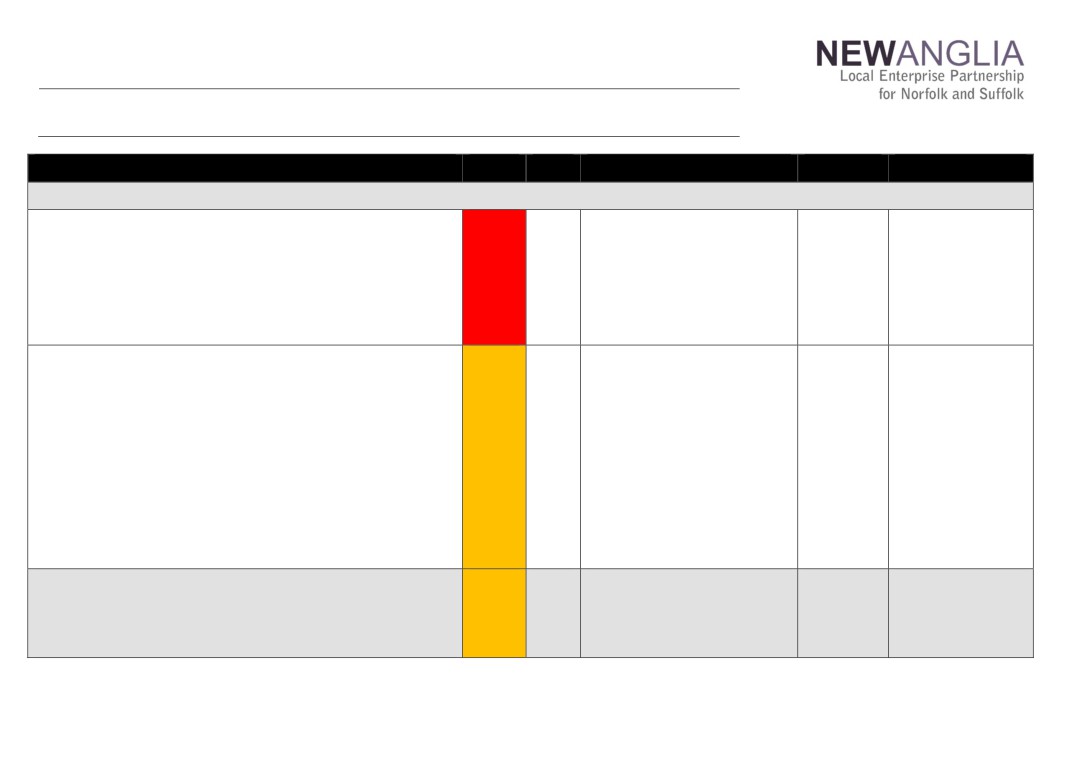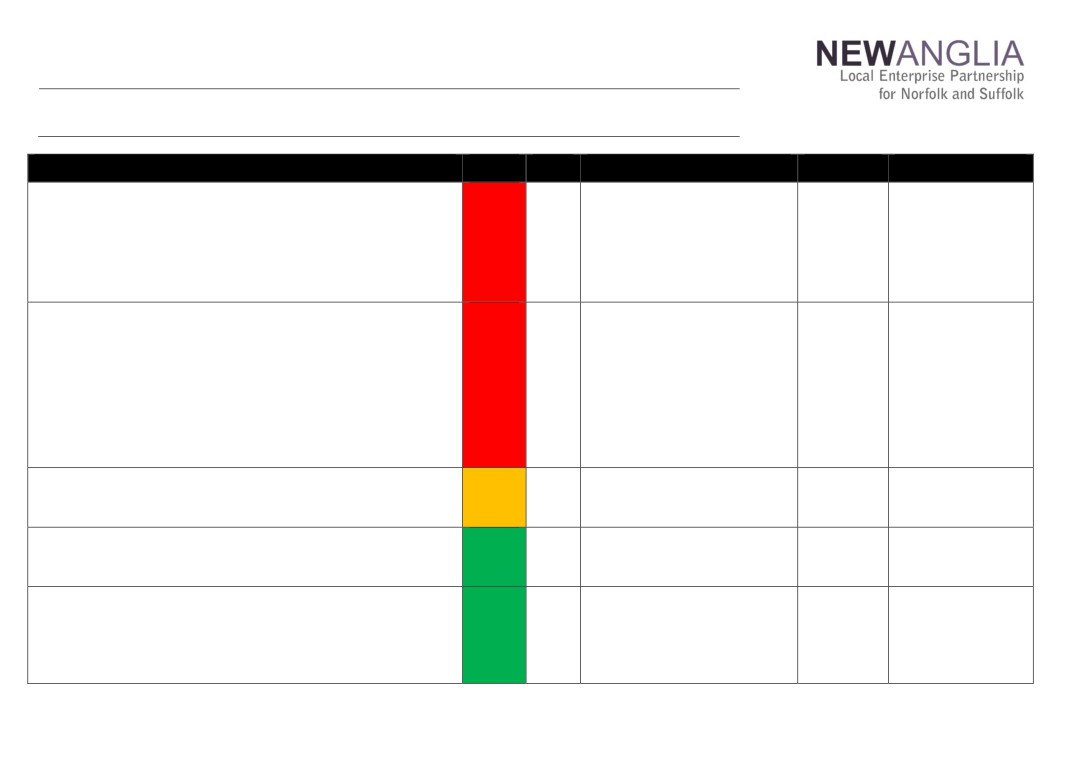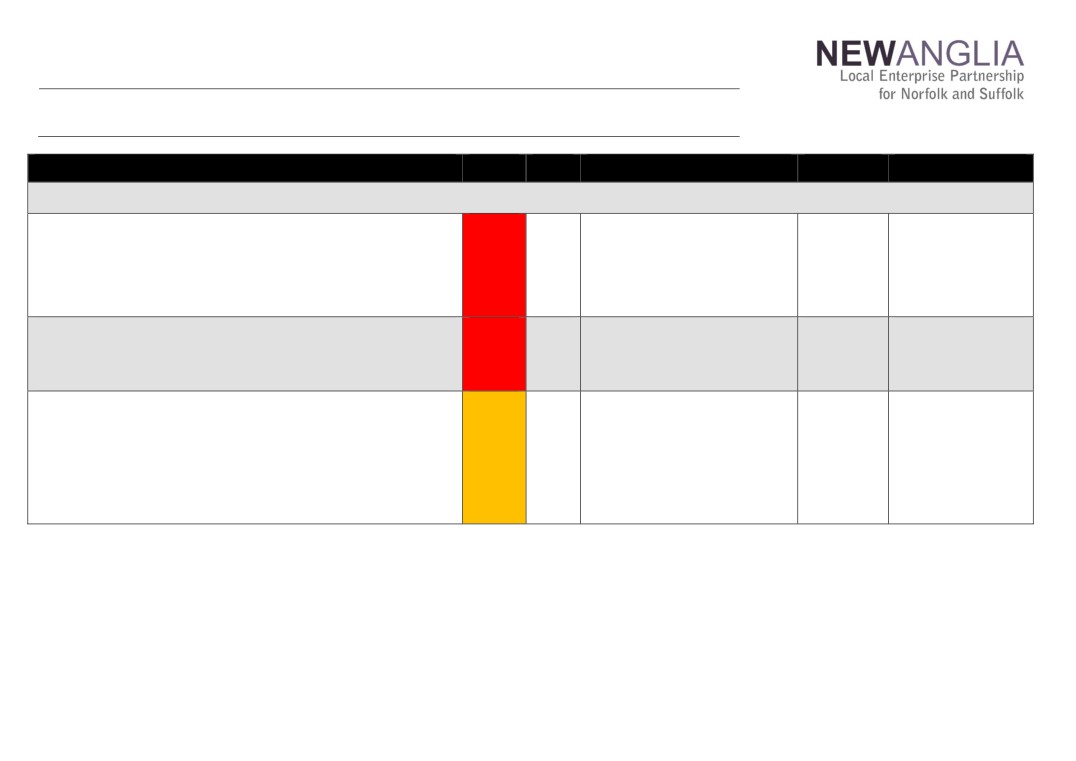New Anglia Local Enterprise Partnership Board Meeting
Wednesday 17th January 2018
10.00am to 12.30pm
Orbis Energy, Wilde Street, Lowestoft, Suffolk, NR32 1XH
Agenda
No.
Item
Duration
1.
Welcome
2.
Apologies
3.
Declarations of Interest
20 mins
4.
Welcome from Orbis Energy
5.
Actions / Minutes from the last meeting
Forward looking
30 mins
6.
Aims and Objectives for the Year - Presentation
For discussion
Governance and delivery
100 mins
7.
Capital Growth Programme Projects including Confidential Tables
For Approval
8.
New Anglia Voluntary Community Sector Programme Extension
For Approval
9.
Integrated Health and Employment Service Proposal
For Approval
10.
Growing Places Fund investment The Malthouse - Confidential
For Approval
11.
New Anglia Capital - Confidential
Update
Chief Executive’s report
12.
Update
including PwC and Mary Ney Review Implementation Plan
13.
Finance Report including Confidential Appendices
Update
14.
Appointment of New Director - Confidential
For Approval
15.
Remuneration Committee - Confidential
For Approval
16.
Any Other Business
Date and time of next meeting: 21st February, 2018. 10am-12.30pm
Venue: The Marble Hall, Surry Street, Norwich, NR1 3NG
1
New Anglia Board Meeting Minutes (Unconfirmed)
22nd November 2017
Present:
Cllr David Ellesmere (DE)
Ipswich Borough Council
Doug Field (DF)
East of England Coop
Cllr Cliff Jordan (CJ)
Norfolk County Council
Dominic Keen (DK)
High Growth Robotics
Cllr Colin Noble (CN)
Suffolk County Council
Cllr Andrew Proctor (AP)
Broadland District Council
Prof David Richardson (DR)
UEA
Sandy Ruddock (SR)
Scarlett & Mustard
Dr Nikos Savvas (NS)
West Suffolk College
Jeanette Wheeler (JW)
Birketts
Tim Whitley (TW)
BT
In Attendance:
Cllr Mike Stonard
Norwich City Council (For Alan Waters)
Shan Lloyd
BEIS
Katherine Hunt
BEIS
Chris Dashper (CD)
New Anglia LEP
Hayley Mace (HM)
New Anglia LEP
Lisa Roberts (LiR)
New Anglia LEP
Keith Spanton (KS)
New Anglia LEP
Chris Starkie (CS)
New Anglia LEP
Helen Wilton (HW)
New Anglia LEP
Tracey Jessop (TJ)
Norfolk County Council
Sue Roper (SuR)
Suffolk County Council
Page 1 of 6
3
Actions from the meeting: (22.11.17)
LEP Governance Review
To express preferences over committee roles to LiR by 1st December
ALL
Business Investment Proposal - Confidential
To receive more detail on the skills spending within the proposal
NK
May Ney Review Including Standards of Conduct
To receive details of where the policies can be accessed.
HM
Board Forward Plan
To provide feedback on the plan and propose any additional items
ALL
Business Performance Reports
To receive a proposal on the Eastern Agi-Tech initiative by email.
CS
1
Welcome from the Chairman
Doug Field (DF) welcomed everyone and thanked Tim Whitley for hosting the meeting. He welcomed
Katherine Hunt from BEIS and Mike Stonard who is deputising for Cllr Alan Waters.
2
Apologies
Apologies were received from:
Cllr John Griffiths
Steve Oliver
Lindsey Rix
Cllr Alan Waters
Julian Munson
3
Declarations of Interest
Full declarations of interest can be found at http://www.newanglia.co.uk/about-us/the-board/.
The board were reminded that declarations of interest are required as part of LEP scrutiny and must be
submitted to the LEP office at the earliest convenience.
Declarations relevant to this meeting:
Jeanette Wheeler (JW) noted an interest in Item 7 and did not take part in the relevant discussion or
decision.
JW also declared an interest in the update on the CITB Announcement provided by Chris Starkie (CS)
within his Chief Executive’s Report.
4
Welcome from Adastral Park
Tim Whitley (TW) welcomed Board members to Adastral Park.
TW provided a presentation on the importance of BT & EE to the immediate geographic area
and gave an overview of the work carried out at Adastral Park.
5
Minutes of the last meeting 25th October 2017
Actions from last meeting updated as follows:
Implementing the Economic Strategy: Review of LEP Programmes
To be advised of the retention rate of jobs created through the VCS Challenge Fund - this has
CD
been requested and a response awaited from the Norfolk Community Foundation.
Investigate whether any Co-Ops have applied for the VCS Challenge Fund - this has been
CD
requested and a response awaited from the Norfolk Community Foundation.
To receive Terms of Reference for each fund - Hard copies are available from Chris Dashper
CD
(CD) or can be emailed on request.
Board to receive business cards with contact details for the Growth Hub and the programmes
HM/HW
team - awaiting delivery.
Britvic and Unilever Presentation
To receive an update from CS following the meeting on 26th October - included in the Chief
CS
Executive’s Report.
6
LEP Governance Review
Lisa Roberts (LiR) took the paper as read and reviewed the proposed scope and approach for
the governance review outlining the recommendations for the Board to consider.
The Board discussed the proposed new structure and the changes to the boards and
committees detailed under the diagram of the First Tier.
Page 2 of 6
4
David Ellesmere (DE) queried whether each of the priority areas should have its own
representative on the new board for the delivery of the Economic Strategy.
LiR advised that the make-up of the Boards had yet to be decided and that the terms of
reference for the Board would be worked up following the decisions made at this Board
meeting. The initial plan was that the priority areas would be represented through the Growth
Groups.
LiR noted that the recommendations being put to the Board were focussed on agreeing the
structure and the way forward and the composition and details would be presented at a later
date.
In order to ensure that the best committee members were in place for each group, the review
would establish membership from scratch and LiR asked that Board members contact her with
expressions of interest in particular boards/committees.
DE noted that the chair of the Economic Strategy Implementation Board should be neutral and
not tied to any particular theme.
The Board agreed:
To note the content of the report
To agree the scope of the governance review
To agree the proposed approach and timetable for phase 2
To agree the recommendations presented for the first tier of the new structure
ALL
To express preferences over committee roles to LiR by 1st December
7
Business Investment Proposal - Confidential
Page 3 of 6
5
The Board agreed:
To receive more detail on the skills spending within the proposal from Nicole Kritzinger
NK
(NK)
That the LEP executive develop relevant funding agreements to ensure the proposed
outcomes are realised, and appropriate clawback mechanisms are in place.
8
May Ney Review Including Standards of Conduct
Chris Starkie (CS) took the majority of the paper as read and reviewed the key points of the
paper.
DE noted that the Standards of Conduct included details of employees remaining politically
neutral and queried whether this meant that they would not attend any meeting at which only
one political party was present.
The meeting discussed the issues around the attendance at meetings with representatives
from political parties and agreed the policy should be amended for clarity over this issue.
CS confirmed that the Whistle-Blowing Policy is currently being updated.
DF requested that all policies be available to access for Board Members.
The Board agreed:
To note the content of the report
To formally adopt the Mary Ney recommendations
To endorse the timetable outlining the implementation of the recommendations.
To adopt the revised polices around conduct, subject to emending the paragraph on
political meetings.
HM
To receive details of where the policies can be accessed.
9
LEP Board Attendance Policy
Doug Field (DF) took the majority of the paper as read and reviewed the key points of the
proposal.
The Board agreed:
To note the content of the proposal
To accept the recommendations made in the report
10
Board Forward Plan
LiR took the majority of the paper as read and asked for questions for the Board.
The Board was advised that the plan would change going forward as the implementation plan
for the Economic Strategy was developed.
Board members were asked for feedback.
The Board agreed:
To note the content of the plan
To provide feedback on the plan and propose any additional items
ALL
11
PwC Report
Doug Field (DF) took the majority of the paper as read and asked the Board for questions
Page 4 of 6
6
Shan Lloyd (SL) noted that while the implementation of the Mary Ney review needed to be
done by 28th Feb 2018 further changes to the Assurance Framework would not be required
until after the further review has been completed.
The Board agreed:
To note the content of the report.
12
Chief Executive’s Report
CS took the majority of the paper as read and provided an update on the following items:
Confidential-
CITB Announcement - A proposal has been made to close the office at Bircham Newton and
relocate the head office to Peterborough. Investigations are ongoing regarding retaining the
card business in situ and also to retain the training section of the site.
Tech Clusters - Plans have been announced to expand the Tech clusters have included
Cambridge but not Norwich or Ipswich. The LEP is supporting the aim to create an East cluster
covering multi-sites and asked for support from the Board.
CS and DF proposed to Greg Clark that the LEP be used to trial the local industrial strategies in
order to be at the front of any changes and have a positive influence in the implementation.
The Board agreed:
To note the content of the report
To support the proposal around a Tech cluster for Norwich, Ipswich and Cambridge.
To ask Government that the New Anglia LEP be a pilot local industrial strategy area.
13
Business Performance Reports
CS took the majority of the papers as read and asked for questions from the Board.
It was noted that, given the ongoing changes to boards, the BPRs will also be subject to review
and so will not be included in the January Board pack.
Ambitions Dashboard - LiR noted that much of the dashboard data was reported annually
and that this would be investigated as part of the implementation of the strategy. The detail
behind the reduction in jobs in the region was being investigated further. The speed of housing
delivery was increasing although still below target.
Call for Projects - Applications are still being received. Those not meeting the conditions of
this call will be held in preparation for future calls.
DK asked how many applications had been received and whether any were turned down due
to lack of available funds.
CD advised that the call for projects under the Capital Growth Programme was likely to be
oversubscribed. He also said that in programmes such as the Growing Business Fund or
Small Grants Programme, bids had not been turned down due to funding availability but were
sometimes scaled down or rejected due to suitability with the criteria. The Growth Deal had
traditionally been oversubscribed so projects were selected that demonstrated the best
strategic fit, deliverability, outcome and value for money. This information can be added into
future reporting.
Growth Deal - Some legal agreements have proved more complex than expected but were
due to be in place before Christmas. The focus is now on chasing spend to ensure it is in place
as agreed however a mechanism for a capital swap has been put in place with Norfolk County
Council for this year.
Page 5 of 6
7
Eastern Agri-Tech - CS provided an update on the programme. GCGP funding is still frozen
however an Agritech panel is still in place to assess and approve projects. A proposal is being
drawn up for the LEP Board on how to manage the financial delivery of projects in Norfolk and
Suffolk approved through that panel, on a case by case basis. This will be circulated to the
Board in December for agreement.
Communications - Hayley Mace (HM) noted that the new website was now live and details of
usage statistics would be built into future reports.
Confidential -
The Board agreed:
To note the content of the report.
To receive a proposal on the Eastern Agi-Tech initiative by email.
CS
14
Finance Report
Keith Spanton (KS) reviewed the Finance report as included in the Board papers highlighting
the following items:
Wages and Salary - LEP staffing is now almost at full capacity. Marketing costs for MIPIM and
Venturefest have come in lower than budgeted.
Legal & Professional fees are higher than budgeted.
The Board agreed:
To note the content of the reports.
15
Eastern Agri-Tech Initiative
To be circulated by email in December.
16
Any Other Business
None
Next meeting:
Wednesday 17th January 2018, 10am-12.30pm
Orbis Energy, Wilde Street, Lowestoft, Suffolk, NR321XH
Page 6 of 6
8
Actions from New Anglia LEP Board Meetings
Date
Item No.
Action
Update
Actioned By
Status
22/11/2017
LEP Governance Review
All
Completed
To express preferences over committee roles to LiR by 1st December
22/11/2017
Business Investment
To receive more detail on the skills spending within the proposal
Further details to be included in the funding
NK
On-Going
Proposal
application
22/11/2017
Mary Ney Review
To receive details of where the policies can be accessed.
Published on web site with link issued to Board
HM
Completed
members
22/11/2017
Board Forward Plan
To provide feedback on the plan and propose any additional items
ALL
Completed
22/11/2017
Business Performance
To receive a proposal on the Eastern Agi-Tech initiative by email.
On hold pending clarification on the situation
CS
On Hold
Reports
at GCGP
25/10/2017
Implementing the
To be advised of the retention rate of jobs created through the VCS Challenge
To be provided at the November Board
ID
On-Going
Economic Strategy
Fund
meeting
25/10/2017
Implementing the
Investigate whether any Co-Ops have applied for the VCS Challenge Fund
To be provided at the November Board
CD/ID
On-Going
Economic Strategy
meeting
25/10/2017
Implementing the
Board to receive business cards with contact details for the Growth Hub and the
Card have been ordered and delivery awaited
HM/HW
Completed
Economic Strategy
programmes team.
20/09/2017
Business Performance
To receive a future report on the approach to NAC investments
To be presented to the Board in January
CD
On-Going
Reports
23-May-17
Inward Investment
An inward investment/international committee to be created with Jeanette
A committee has been established with the
JM
Completed
framework
Wheeler, David Richardson, Mark Goodall and Tim Whitley.
first meeting being planned
9
New Anglia Local Enterprise Partnership Board
17th January 2018
Agenda Item: 7
Capital Growth Programme Call: Project recommendations
Author: Chris Dashper
Summary
The Capital Growth Programme call for projects was launched immediately following the
October 2017 LEP Board meeting.
Under the call £9m of grant funding from the Growth Deal has been made available to
support projects that help deliver the new Economic Strategy.
A total of 29 project Expressions of Interest were received, with sectors including
infrastructure, transport, employment projects, skills and cultural themed projects.
All projects have been independently appraised using a comprehensive range of criteria.
However questions raised by the independent appraisers means that the majority of the
projects need to supply further information to allow a more detailed assessment to take
place before a decision can be made on whether or not they should be recommended for
funding.
This paper recommends approving two projects which satisfy the criteria and require a timely
decision, deferring decisions on a further 20 projects pending further information and
rejecting seven projects.
Deferred projects, depending on when they are ready, would be brought back to a spring
board meeting or referred to a further Growth Deal funding round, currently scheduled for the
summer or autumn of this year.
Recommendation
The Board are asked to:
Approve the award of Growth Deal grant funding to the following projects in table 1:
Bacton to Walcott Coastal Management Scheme
Cefas Research Centre
Approve the recommended decision option for each of the projects in tables 2 and 3:
Table 2: Recommended to defer
Table 3: Recommended to reject
1
11
Background
The Capital Growth Programme call for projects was launched immediately following the
October 2017 LEP Board meeting.
Under the call £9m of grant funding from the Growth Deal has been made available to
support projects that help deliver the new Economic Strategy.
Of this funding £4.3m came from the deallocation of existing projects in Growth Deals One
and Two and £4.7m from our Growth Deal Three allocation.
The call for projects closed on 30 November 2017. A total of 29 project Expressions of
Interest were received, with sectors including infrastructure, transport, employment projects,
skills and cultural themed projects.
Following a first stage sift of the projects, our independent appraisers Hewdon Consulting
have completed the initial appraisal of the project applications received.
All projects have been appraised in accordance with HM Treasury Green Book principles of
viability, value for money, achievability, affordability and need.
To ensure that projects reflect New Anglia LEP priorities and most importantly assist in the
delivery of the Economic Strategy, the Strategic Prioritisation Framework, developed with
Metro Dynamics has also been applied by Hewdon Consulting.
Key areas have been scored 1-5 for each project, with 5 being the highest.
Details of the appraisal methodology can be found after the tables at appendix 1.
The top two projects are recommended for approval. Their scoring was clearly higher than
all other projects and they require a timely decision. These projects would utilise £2.48m of
the £9m. Details of these projects are in table one.
Most of the other projects need to supply further information to allow a more detailed
assessment to take place before they can be brought forward for a decision by the board.
None of these projects requires an urgent decision to be made. Details of these projects are
in table two. The information contained in this table should be considered confidential.
We recommend the LEP executive continues to engage with these projects, with a second
batch brought for consideration at a spring board meeting when ready. Funding available for
this would be £6.52m, being the balance of the £9m assuming the two projects for approval
are agreed.
Looking further ahead, once the £9m from this call is fully allocated, the Capital Growth
Round will still have £23m available and we are planning a second call for projects later in
the year. This will be in the summer or autumn.
Deferred projects if not ready to be funded in the spring round, will be encouraged to bid into
this new round.
Given the learnings from this round, chiefly that very few projects provide the level of
information required for a decision to be made, the next round will need some tweaks to the
process.
The main change will be to allow more time between the completion of the independent
appraisal and the board decision.
2
12
This will allow project promoters to supply more information which was lacking in their
application, or to answer specific queries raised by the project assessor.
We will also be working to ensure that applications to the new call are of a higher standard.
Finally there were a number of projects which were not strictly eligible for funding via this
mechanism. There were also a few applicants seeking additional funding for projects which
have already received funding from the Growth Deal. The LEP board has previously
indicated it would only put more money into a project if there were additional outputs
generated as a result of the further investment. Details of these projects are in table three.
The information contained in this table should be considered confidential.
Project sectors by county
Project Sector
Norfolk
Suffolk
Total
Flood defences and
6
2
8
Infrastructure
Transport
2
5
7
Employment Space
2
3
5
Skills
2
4
6
Tourism Culture and Media
2
1
3
Total
14
15
29
Financial implications
The two projects recommended for approval would utilise £2.48m of the £9m.
This would enable £6.52m to be available for a spring approval round.
A further £23m would then remain for a future call to be held in the summer/autumn.
Recommendation
The Board are asked to:
Approve the award of Growth Deal grant funding to the following projects in table 1:
Bacton to Walcott Coastal Management Scheme
Cefas Research Centre
Approve the recommended decision option for each of the projects in tables 1 and 2:
Table 2: Recommended to defer
Table 3: Recommended to reject
3
13
Projects to be approved (Table 1)
Name of Project
£
Outputs
Strategic
Deliver-
Additio-
Economic
Total
State Aid
Recommendation
Request
fit
ability
nality
Impact
Compliant
Bacton to Walcott
1.08
1258 jobs
5
5
5
5
20
Yes
Approve
Coastal Management
222 homes protected
Scheme
230 businesses
£51m GVA
Cefas Research
1.40
450 jobs safeguarded
5
5
3
3
16
Yes
Approve
Centre upgrade
50 new jobs created
3200m2 office space
5300m2 refurbished
space
11-15 Apprenticeships
4
14
Appendix 1
Appraisals for approved projects
Bacton to Walcott Coastal Management Scheme £1.08m
Project
Bacton to Walcott Sandscaping Project
Applicant
North Norfolk District Council
Request
£1,080,000
Summary of Proposal - The Bacton to Walcott Sandscaping Project seeks to protect
Bacton Gas Terminal and the adjacent villages from coastal erosion by an innovative
Dutch ‘Sandscaping’ method. Large volumes of sediment (1.5-1.8 M cubic metres) will be
placed on the beaches in front of the soft cliffs to protect the area’s sea defences from
damage. The project cost is £17-20m and it is scalable, with the higher cost enabling more
sand to be poured and better protection. The private sector (Bacton Terminal) is
contributing £12.2-13.4m and £6.5m is coming from various public sector sources. The
contribution from the LEP would help the project reach optimum size.
Outputs
1,258 jobs secured
222 homes protected from flooding
Project supports 230 businesses and £51 million of annual GVA
In addition the flat sand beach created could attract sand yachts, kite surfing etc and boost
the tourist economy.
Strategic fit - The Economic Strategy recognises Bacton Gas Terminal as “a major
component of UK energy infrastructure, providing one third of the UK gas supply, making it
an essential component in ensuring the future energy security of the UK.” It also says that
“Infrastructure improvements underpin all our priority places and themes [including] Flood
defences that unlock or protect housing and commercial development.”
Deliverability of Project
This is a very sophisticated project with an international consultant team and subject to the
rigorous EA Green Book appraisal process. It is expected to receive Outline Business
Case approval in early 2018, leading to completion of detailed design and consents. The
project would start in Spring 2019 and take 4 months to complete. Even if the programme
were to slip, it should still be possible to draw down LEP funding in 2018-19.
Additionality
As this is a flood defence project, it largely safeguards existing activity and the additionality
in terms of increased economic activity is poor. For this reason, the government assesses
flood defence projects in terms of activity safeguarded, which is a more appropriate
measure. For this project, the “do nothing” option is to put a third of the UK gas supply at
risk. More guidance is set out in EA’s “Guidance for Risk Management Authorities” (Feb
2014)
Value for money
To obtain OBC approval the project will have to demonstrate a BCR in excess of 1:1. The
bid states that it is estimated as a minimum of 1:1.34 and could be as high as 1:6
State Aid Compliance
8
18
More detailed due diligence will be required but the state aid position appears to be
acceptable.
Comments
This project has national importance, is deliverable and will pass the government’s own
additionality test before proceeding. There is a slight concern about state aid although the
risk of challenge appears very slight.
Recommendation
Approve, subject to due diligence, particularly on state aid issues.
Cefas Research Centre
Project
CEFAS Marine Science Hub
Applicant
Department for Environment, Food & Rural Affairs
Request
£1,400,000
Summary of Proposal - To provide a long-term, fit-for-purpose marine science facility that
will secure the Centre for Environment, Fisheries and Aquaculture Science (CEFAS) in the
region for the next 40 years. Defra have considered a range of national alternatives. The
project will deliver:
- The replacement of Victorian, 1930’s and 1960’s buildings with a modern, fit for
purpose facility saving £2m per annum in capital and running costs;
- Scientific operations will be greatly enhance as physical interactions are enabled
driving innovations;
- Significant image and brand enhancement to better attract global customers and staff;
Outputs
Safeguard 450 CEFAS jobs
3200m2 of new office space
5300m2 of refurbished laboratory and office space
12-15 apprenticeships per annum
50 immediate subcontractor jobs
Strategic fit - CEFAS is specifically referenced in both the SEP and the Economic
Strategy. Its presence in Lowestoft is seen as a vital component of the Life sciences
cluster which includes University of East Anglia and Norwich Research Park with two
major UK life science centres in the John Innes Centre and Sainsbury Laboratory. This
project secures CEFAS in Lowestoft. Their presence provides a critical mass to the
ambition for a Life Sciences cluster.
Deliverability of Project - the project appears to be in the advance stages of preparation,
though final costings are now expected by April 2018. The application states the following
have been obtained / secured:
Full planning permission approved in July 2017
Defra funding
Experienced contractor appointed
A fully developed business case
Designs developed to RIBA stage 3
9
19
This information is taken at face value for now but each should be evidenced if an award is
to be made.
Additionality
- While no new jobs, or dwellings will result from this project, the
application does state that this project will support CEFAS Lowestoft with potential for 10-
20% growth over coming years. The 34,000 additional sqft could play a role in this though
as the project includes the demolition of the former grand hotel building and ancillary
buildings it is not clear how much net additional space is being created.
Value for money - The development of a more modern and fit-for purpose working
environment and facility to support the 440 skilled jobs directly supported by CEFAS are
vital to this area of Norfolk and Suffolk. Two minor points require confirmation before the
final offer is released:
.No breakdown of the build costs was included in the application. The project appears
to deliver a cost per sqm of new or refurbished spaced for £1,800 which is acceptable.
However further review is needed on the refurbishment costs in particular, to be clear
on the extent of works being undertaken and the added value generated by the
refurbished space.
The project also includes the demolition of the former grand hotel building and ancillary
buildings. It is not clear from the application how much net additional space is being
created.
State Aid Compliance - As a government agency housed in a building owned by a
government department, it is assumed that any public funding would be state aid
compliant.
Comments - CEFAS is a world class centre for marine science, research and
sustainability and is a key player in the economic offer of Norfolk and Suffolk. The LEP
considers CEFAS to be a strategic partner in the delivery of the outcomes contained in its
Economic Strategy, and believes that the CEFAS’ expansion plans involve an attractive
and progressive design very much in keeping with the wider regeneration of the Lowestoft
sea front. The development of a more modern and fit-for purpose working environment is
vital to this area of Norfolk and Suffolk. New Anglia LEP held the June Board meeting at
the current CEFAS building.
Recommendations - This project is supportable subject to final due diligence.
Appendix 2 Appraisal Process
New Anglia LEP Strategic Prioritisation Framework - key areas
Strategic Fit
Consideration of whether the aim of the project is referenced in the Economic Strategy. Also
consideration of national economic development policy priorities, particularly those in the
Autumn Budget 2017 and the Industrial Strategy White Paper.
Deliverability
The main criterion was whether the project was sufficiently well advanced to draw down LEP
funding in 2018/19 and to complete by 2020/21 as the Call required. Key indicators of
deliverability included:
o Planning consent and land acquisition in place
10
20
o Other funding being committed
o A well-developed business case
Additionality
Projects should be able to demonstrate the addition of measurable direct outputs
corresponding to those in the Economic Strategy - such as jobs, houses, or Gross Value
Added (GVA) increase.
Economic Impact and VfM.
Ideally the outputs should be converted to a monetary value such as GVA and compared
with the cost to obtain the Net Present Value of the intervention. The exception is transport
projects for which a Benefit:Cost Ratio (BCR) is used.
Call for Projects criteria
In addition to the strategic prioritisation framework, projects have been assessed in line with
the key criteria outlined in the Call for Projects paper from October board including:
Capital Growth Programme Core outputs
Connectivity- investing in essential projects and assets that improve the infrastructure
and which create a modern, mobile, accessible future-proof digital connected
economy.
Unlocking Growth- investing in infrastructure that unlocks or protects housing or
commercial developments in our key growth locations.
Investing in skills- investing in projects that deliver the higher level skills needed to
drive growth across our economy with a particular emphasis on our ‘innovation’ and
‘enabling’ sectors,
Key project assessment criteria
Whether the need for the project has been clearly demonstrated
Evidence of option appraisal and business case
How well the project meets the priorities of the Economic Strategy
How well the project fits with local and sub-regional plans and priorities
Potential for alternative funding, partnering and joint schemes
Estimated costs with level of detail to reflect the current stage of the project
Potential of the project to contribute to economic growth
Potential of the project to achieve payback
How likely the project is to be successful
How risks will be managed and mitigated
Economic outputs and impacts created by the project
How the benefits of the project will be sustained after LEP funding finished
Further Appraisal techniques used in the assessment of the projects:
Justification of local economic need
Evidence of failure in commercial markets
Viability gaps for development of sites
Opportunity to accelerate delivery of development
State Aid
11
21
New Anglia Local Enterprise Partnership Board
Wednesday 17th January 2018
Agenda Item 8
Voluntary and Community Sector Prize Challenge Fund
Author: Iain Dunnett
Recommendation
The Board are asked to:
1. Note the commitment of Norfolk and Suffolk Community Foundations in seeking
further public/private match funding for the Voluntary and Community Sector (VCSE)
Prize Challenge Fund.
2. To agree the re-scoping of the criteria for the fund as described in this paper.
3. To agree that the LEP makes the further commitment of a £250,000 grant from the
Growing Places Fund for 2018/19 and to agree to review further commitments for two
years beyond 2018/19 at an appropriate stage.
4. To agree that two LEP Board Members are selected to sit on the Funds Appraisal
Panel.
Background
In 2014 the New Anglia LEP Board approved a grant of £500,000 from the Growing Places
Fund to develop the VCSE Prize Challenge Fund for the sector.
By working in partnership with the Norfolk and Suffolk Community Foundations the
programme has been able to support ready for work and employment initiatives developed
by VCSE organisations operating across both counties. The funding was split evenly over
three years from 2014 to 17.
The VCSE Prize Challenge Fund was designed to;
Meet employability outcomes by providing grants to grassroots VCSE
organisations.
Enable them to support people furthest from the labour market towards becoming
work ready or into employment.
Encourage innovation in the VCSE around employability and skills.
The model deployed included annual grants of £20,000 per annum awarded to 8 VCSE
sector applicants, with the facility to award further investment of £25,000 later in the project
1
23
to the two best performing projects to help them to scale up and sustain their activity and
deliver more outputs. Those projects selected were able to demonstrate an innovative
approach to supporting those furthest from the labour market and an ability to co-invest
other funds into the programme.
The decision making progress for the allocation of grants involves an application process
overseen by the Community Foundations which includes;
A call for projects.
Applications being assessed by Foundation staff.
Applications considered by an appraisal panel with LEP Board representation.
A decision then conveyed to the organisation.
The lessons learned from the first three years are articulated below as follows:
The VCSE has significant potential to deliver employability outcomes.
The ‘work ready’ aspect needs more definition to enable groups to be able to report
across a spectrum of work readiness outcomes.
The programme has attracted a good range of VCSE organisations.
Outcomes
The outcomes achieved were as follows:
227 people into employment over the three years.
628 people developed to a work ready situation.
30 projects supported in delivering employability and work outcomes.
The specific outcomes per project can be seen in Appendix A. Where there are gaps for
project results the outcome results are still awaited. Data is not available for some projects
until April for the current year projects, and June for those currently working through a year 2
award. Outputs achieved for some individual projects are lower than targets set, but this
must be viewed against the nature of the client group and extreme variations between
projects and individuals on how long it can take to achieve those outcomes, conversely this
is part of the reason to extend LEP funding to ensure the work continues with this client
group and is not a short term “funding one off”.
Although the fund was established prior to the publication of the LEP’s Economic Strategy
the fund has supported the LEP to realise ambitions within the Economic Strategy, in
particular to the development of skills in key sectors, employability and attainment
standards across Norfolk and Suffolk.
Proposal
Now the programme has successfully run for three years further work has been completed
on developing a proposal for a successor programme and re-scoping the criteria to ensure
linkage to the Industrial Strategy Key Sectors; to assist in implementing the LEP Skills Board
approved Sector Skills Plans; and supporting the LEP to realise its ambitions within the
Economic Strategy in particular to the development of skills in key sectors, employability
and attainment standards across Norfolk and Suffolk .
2
24
The LEP Board are requested to consider providing an additional £250k grant from the
Growing Places Fund to extend the programme over 2018/19, and to consider at a suitable
future stage a financial commitment for a further two years of operation, from 2018 to 2021.
This will sustain the positive employment outcomes and impact the fund has had within the
sector, and directly support the delivery of one of the key strands of the Economic Strateg -
“inclusive growth”.
As part of this continued activity the Community Foundations are seeking further
public/private match funding for the Prize Challenge Fund. It is expected that the successful
model used previously will be largely replicated and the general application criteria will be re-
used.
Re-scoping has indicated that further consideration will be given to the development of target
activities that have a high social investment value in relation to the objectives of the LEP and
the VCSE. For instance, the development of Care Farms and Care Social Enterprises,
Cooperatives/projects concerning the disposal of public assets to the voluntary and
community sector, or cultural/museum projects that have a strong volunteer/ tourism/visitor
economy benefit, would potentially be projects that both the LEP and VCSE would share an
interest in supporting.
Proposals for other elements of re-scoping the Community Challenge Fund include the
following:
Offering a two tier programme that offers opportunities for smaller, innovative VCSE
organisations as well as significant multi-year grants for larger organisations capable
of high level delivery and/ or consortium proposals.
Strengthening the links/ match funding requirement from the private sector for large
grant applicants.
In relation to “small” grants the overall targets for each year will be maintained at an
aggregate of 100 people into employment and 300 people becoming work ready.
In relation to “large” grants each application will be judged on its merits. However the
expectation will be that the larger grant awards will deliver significant results against
the new criteria.
New outcome headings will be added to the programme to develop a better
understanding of the projects effectiveness in relation to work readiness and
employment outcomes, and the projects ability to attract match funding. These new
outcome headings will be in the following areas:
1. Entered into self-employment.
2. Entered an apprenticeship.
3. Become a regular volunteer.
4. Achieved accredited qualifications.
5. Completed a work experience placement.
6. Entered or re-entered education or training.
7. Achieved increased basic skills.
8. Projects ability to attract match funding.
9. Job retention rates.
10. Cooperatives supported.
Finances
3
25
The funding required would be an allocation from this year’s LEP’s Growing Places Fund
budget. An allocation was previously agreed as part of this year’s budget and is therefore
available to invest in this project.
Recommendation:
The Board are asked to:
1. Note the commitment of Norfolk and Suffolk Community Foundations in seeking
further public/private match funding for the VCSE Prize Challenge Fund.
2. To agree the re-scoping of the criteria for the fund as described in this paper.
3. To agree that the LEP makes the further commitment of a £250,000 grant from the
Growing Places Fund for 2018/19 and to agree to review further commitments for two
years beyond 2018 at an appropriate stage.
4. To agree that two LEP Board Members are selected to sit on the Funds Appraisal
Panel.
Appendix A
Three year results monitoring report and projects are shown below. Where there are gaps
for project results the outcome results are still awaited. Data is not available for some
projects until April for the current year projects, and June for those currently working through
a year 2 award. Outputs achieved for some individual projects are lower than targets set on
a number of projects, but this must be viewed against the nature of the client group and
extreme variations between projects and individuals on how long it can take to achieve those
outcomes.
New Anglia LEP Outcomes 2014 - 2017
Suffolk
Organisation
Work Ready -
Work Ready -
Employment -
Employment
supported
Target
Actual
Target
- Actual
Museum of East
20
15
8
15
Anglian Life (MEAL)
Suffolk Sport
40
41
8
27
Julian Support
24
6
24
0
Access Community
50
101
25
28
Trust
Suffolk Sport (Year 2
8
8
4
4
prize)
MEAL (Year 2 prize)
36
27
18
12
Limeskills
30
41
20
17
Headway
25
27
15
21
Pro Corda
15
13
0
7
Cook with Me
40
56
32-48
3
Headway (Year 2
30
20
prize)
The MIX
30
12
Suffolk Refugee
10
5
4
26
Support
Eastern Enterprise
45
20
Hub
Inspire Suffolk
96
52
Access Community
50
30
Trust
Suffolk totals:
549
335
309
134
Norfolk:
Organisation
Work Ready -
Work Ready -
Employment -
Employment
Target
Actual
Target
- Actual
Bicycle Links
36
30
8
7
Equal Lives
28
21
7
3
GYROS
69
86
27
16
Harleston Information
25
34
10
18
Plus
Equal Lives (Year 2
5
0
prize)
St Edmunds Society
45
20
25
12
Action Community
24
21
8
9
Enterprises CIC
Purfleet Trust
60
61
15
19
Clinks Care Farm
20
15
10
9
Purfleet Trust (Year 2
80
28
prize)
Action Community
24
10
Enterprises CIC (Year
2 prize)
Voluntary Norfolk
80
21
LEAP East CIC
33
11
Workers Educational
60
18
Association
Norfolk totals:
584
293
198
93
5
27
New Anglia Local Enterprise Partnership Board
Wednesday 17th January 2018
Agenda Item 9
Integrated Health and Employment Service
Author: Iain Dunnett
Summary and Recommendation
The Board are asked to:
1) Support the overall purpose of the proposal against the key LEP objectives of
employability and skills.
2) Agree match funding at a rate of £120k per annum for three years to the project to
assist in leveraging over £2million of European Social Funds (ESF). This is on a co
investment basis alongside Norfolk County Council and other organisations. The
project will have a total value of circa £5million over 3 years across a range of
funding sources.
This LEP match funding would be in the form of an allocated amount of the Growing
Places Fund which organisations delivering the project will bid into.
Background
This proposed project will be a locally Integrated Health and Employment Service (IHES)
delivering personalised support to unemployed or economically inactive people in Norfolk
with health related barriers to work. In relation to the LEPs Economic Strategy this project
has a clear ambition to “develop new approaches and remove barriers to get people back
into work, especially for those further from the job markets”.
In partnership with organisations from across Norfolk, Norfolk County Council have
developed this proposed project to address the fact that in Norfolk alone there are 55,000
people claiming working age benefits of which approximately 60% have a health related
barrier to work. More than half of current claimants of working age benefits are long term
claimants who have not been able to work for many years. The project will support over
3,000 people to move:
-
into work,
-
closer to work; and
-
back into engagement with education, apprenticeships and training
As a comparison to this proposal local investment aligned to ESF and focused on the
Ipswich MyGo project in Suffolk has seen a large impact on youth unemployment and
outcomes for young people seeking work. The aim with this project in Norfolk is to trial a
1
29
more wide ranging integration of services for a harder to reach group who are largely
economically inactive and not able to contribute to the local labour market or the economy.
Mainstream employment services offer very few effective interventions for this group with
complex barriers meaning that claimants with the aspiration or capacity to move back into
work cannot access the support to do so or rely heavily on oversubscribed voluntary sector
interventions. Additionally employment services do not currently engage with health
providers or deliver health related outcomes despite claimants having a health related barrier
to work; this is why an integrated approach will deliver better outcomes.
The partnership brings together voluntary sector organisations with expertise in employability
or social inclusion and health providers who offer solutions to those with physical or mental
health diagnosis. The proposal would be the first in the country to deliver within a more rural
context providing an opportunity for a local innovation to inspire new ways of working and
new mechanisms for delivering social innovation and social or economic benefits.
The proposal has been submitted to the Department of Work and Pensions (DWP) as a
stage 1 application for ESF and it is hoped that it will progress to stage 2 in early 2018 with a
project start date in Summer 2018.The proposal is currently undergoing stage 1 assessment
by DWP for its suitability to attract ESF.
Proposal
This IHES will deliver personalised support to unemployed or economically inactive people in
Norfolk with health related barriers to work e.g. physical or mental health condition, disability
(including learning disabilities). Support will focus on managing health needs within the
context of employment. Norfolk County Council will be the Accountable Body supported by a
strategic partnership of stakeholders. Delivery will be via Voluntary, Community and Social
Enterprise Sector organisations, with participants referred from Local Authorities, GPs,
Housing Associations and DWP.
Delivery organisations will employ Personal Advisers to work with participants creating
bespoke pathways to employment including one-to-one support; and flexible interventions
through a network of expert partners. In collaboration with participants and health
colleagues, Advisers will:
Develop a support plan identifying targets and milestones.
Engage services addressing health barriers to work.
Assist with health condition management and personal well-being.
Outreach via alternative engagement including arts and sports.
This activity will be funded by the ESF element secured by the partnership alongside Local
Authority match.
Advisers will also undertake referrals to services designed to address health barriers to work
and assist with health condition management in partnership with local Care Commissioning
Groups and NHS trusts, who are partners in the project. Advisers will identify opportunities to
improve participants’ ability to compete in the labour market including:
Accredited training.
Employability skills.
Soft skills e.g. confidence, motivation, resilience, well-being, active living and
supported job search.
Developing a system to link clients to employers within the LEP and Industrial
Strategy Key Sectors; to assist in implementing the LEP Skills Board approved
2
30
Sector Skills Plans; and supporting the LEP to realise its ambitions within the
Economic Strategy.
To fund this activity the voluntary sector organisations would be required to bid into the LEP
for match funding to trial client led innovations and interventions to move local residents into
work. This LEP match funding would be in the form of an allocated amount of the Growing
Places Fund which organisations delivering the project will bid into. This will be a similar
process to that currently in operation for the VCSE Challenge Fund operated by the LEP
with the support of the Norfolk and Suffolk Community Foundations. Indeed this successful
existing process may well be utilised for management of LEP funds into the new IHES
project.
The IHES will enable the LEP to continue to invest in local people and local voluntary sector
groups while adding additional rigour to the process with valuable outcomes around
additional skills and employment. This LEP funding will build directly upon the work already
completed and supported by the LEPs VCSE Challenge Fund, and the nature of this support
from the LEP can be traced through the LEPs Economic Strategy, Skills Strategy and
European Structural Investment Framework. Solutions supporting self-employment linked to
the New Anglia Growth Hub could also be explored.
Activities will be delivered over three years across Norfolk ensuring rural and urban
coverage.
Finance
To create a project of sufficient scale New Anglia LEP would be invited to be one of the
anchor co-investors in the project - not only to contribute to the drawing down of significant
ESF contributions - but importantly to secure the role of the voluntary sector in the delivery.
The proposal is that the LEP invests £120k per annum in the delivery of a 3 year project.
This will sit alongside secured local investment with a project finance profile as follows:
LEP - £360,000
Norfolk County Council - £360,000
Norfolk Districts Pooled Business Rates - £350,000.
Sport England - £100,000
Arts Council - £100,000
Housing Associations - £75k
NHS/Health funding - £1.8m
ESF £2.4m
Clinical Commissioning Groups, Housing Association and NHS match funding will be aligned
to this project to deliver the health related provision. Lastly, to support the social inclusion
and healthy living elements partners have also submitted bids with a value of £100,000 each
to Sports England and the Arts Council to wrap around the core offer. The project will have a
total value of circa £5m over 3 years.
Financial implications
The funding of this project by the LEP would be drawn from the Growing Places Fund
budgets from the three years from 18/19.
Taking into account existing commitments of £3m - there is £750,000 available in 18/19. The
commitments do not include the proposal in item 10.
For 19/20 and 20/21 there are no commitments against the annual allocations of £3.75m.
3
31
Outcomes
By integrating employment and health activity to support participants to manage health
conditions within the workplace the project expects:
-
36% of participants to move into work, including self-employment; and
-
25% of participants to move into education or training including apprenticeships.
The project will deliver a range of outcomes clearly linked to the delivery of the Economic
Strategy including:
Increased skills levels.
Better engagement with the local labour market.
Reduction in skills shortages reported by employers.
Reduced social isolation and improved economic independence.
Improve GVA and economic outcomes for the participants.
There is an opportunity via co-investment in this proposal to develop the social impact and
value of Growth Deal investments. LEP supported projects can stimulate growth in the local
economy but the impact is greatly increased if labour market development also takes place.
The social value and innovation behind the delivery of the LEP’s investments into the local
economy can be accelerated through this project which could provide the pipeline of people
and skills required for Growth Deal supported projects.
The normal LEP monitoring process would be utilised for the projects outcomes, and these
would be complimented by shared outputs monitored by the other partners around health
and social improvement.
Summary and Recommendation:
The Board are asked to:
1) Support the overall purpose of the proposal against the key LEP objectives of
employability and skills.
2) Consider whether the LEP should provide matching finance at a rate of £120k per
annum for three years to the project to assist in leveraging over £2million of
European Social Funds (ESF). This is on a co investment basis alongside Norfolk
County Council and other organisations. The project will have a total value of
£5million over 3 years across a range of funding sources.
This LEP Match funding would be in the form of an allocated amount of the Growing
Places Fund which organisations delivering the project will bid into.
4
32
New Anglia Local Enterprise Partnership Board
Wednesday 17th January 2018
Agenda Item 12 - Chief Executive’s Report
Author: Chris Starkie
Overview
This section provides a snapshot of main LEP team activity since the November board meeting
Annual Conversation
Doug Field Chris Starkie and colleagues from our accountable body (SCC) participated
in the annual conversation with Government officials.
The meeting is a stock check of progress being made by the LEP as well as a review of
governance, delivery and strategy. More detail can be found below.
Implementation of Governance reviews
Work continues on the implementation of both the PwC and Mary Ney reviews.
For Mary Ney - key developments have been the tweaking of a number of policies
around whistleblowing, code of conduct and confidential reporting as well as revised
register of interest forms following the publishing of guidance by Government. The new
forms are being circulated to board members.
More details on the Mary Ney review can be found in the table attached to this report.
Key work implementing the PwC review has been work on the membership of the boards
agreed at the November board meeting, and consultation on the structure of the boards.
More details on the PwC implementation can be found in the table attached to this report.
Growth Deal
The £3.3m legal agreement for the Ely Area Rail Enhancement Scheme to be delivered
by Network Rail has now been signed by both New Anglia LEP and GCGP LEPs and is
just awaiting Network Rail’s signature. Once in place the first £286k of funding can be
released before the end of the financial year.
Growing Places Fund
The Winerack project on Ipswich Waterfront has commenced drawdown of the £5m loan
allocated through the Growing Places Fund. The project is on target to request at least
£1.6m of the £5m loan this financial year, with £500k already released. Preparatory
works are underway at the site, with more extensive building projects set to commence
on site in February 2018.
Capital Growth Programme
The £9m call for projects for the new Capital Growth Programme produced 29 bids for
funding with a request of £49m of funding towards projects worth £183m in total. The mix
of projects included infrastructure, roads, skills and cultural projects. The projects have
been appraised by external consultants, Hewdon Consulting. More details can be found
on agenda item 7.
47
Communications
Media coverage in December included newspaper, TV and radio interviews to promote
the signing of contracts for work to start on the Ipswich Winerack and our work with
Britvic and Unilever in Norwich.
The new LEP website continues to develop, with a timetable for regular staff and partner
blogs now being developed to add interesting and timely content. Other new features
include showcasing the firms which hold the Youth Pledge Marque with scrolling logos,
profiles of the Growing Places Fund projects and additional governance FAQs, which are
regularly reviewed in line with our Assurance Framework and the Mary Ney review to
ensure our information is clear and, importantly, easy to find.
To increase engagement on social media, a new Linkedin company page has been set
up. Despite having a large membership, the current locked group gets very little
interaction but the new page is already popular, with regular likes, comments and sharing
of posts.
Finances
Management accounts for period ended 31 December 2017 - year to date income is
£999k with an operating surplus of just under £144k, this is ahead of budget by just
under £129k
Operating cash balance is £434k which is in line with management expectations
The LEP has received additional income from the Enterprise Zone Pot C fund. Further
details can be found in the finance paper.
LEP actions and activity
This section provides a detailed update on other activities and key issues since the November
board meeting
Annual conversation
Doug Field, Chris Starkie Louise Aynsley and Holly Field from Suffolk County Council
(our accountable body) and other LEP team members took part in the Annual
Conversation with Government in December.
The conversation was led by Hannah Rignell, acting director of BEIS London and
South East and supported by Shan Lloyd.
Hannah explained that the annual conversation was a formal process to discuss the
contribution the LEP has made towards driving local economic growth; to review LEP
governance and assurance processes; to look at progress with delivery on key local
growth programmes; and to discuss the LEP’s priorities and challenges for the year
ahead.
Hannah said that the National Audit Office report and the Mary Ney Review had placed
a stronger focus on governance.
It was therefore important that LEPs are implementing all its local policies and
continuing to improve. Hannah acknowledged that New Anglia had commissioned
PWC to carry out a review of governance and this was a good example of proactive
work to strengthen the LEP.
As well as governance, the annual conversation also covered the LEP’s delivery and
strategy, highlighting the difficulties of managing a capital programme on annual
48
budgets.
The LEP’s new economic strategy was also discussed and BEIS Local agreed to
support the LEP’s bid to develop an early Local Industrial Strategy.
In conclusion Hannah’s conclusion said New Anglia continued to be in the top two
LEPs in the London and South East patch: proactive, with a good culture and
continued to put forward a compelling case.
Following the meeting, the assessment of the LEP will now be subject to moderating
process to ensure all conversations are being carried out on a consistent basis.
Any issues of concern will then be fed back to the relevant LEP. We are not expecting
any issues to be fed back.
Growth Deal Government Data Submission
Since the beginning of the Growth Deal programme, the LEP has reported its outputs
to Government via an online system called ‘Logasnet’. This has now been replaced
with a comprehensive new Workbook.
The Workbook includes 23 spreadsheets and requires the input of both forecast and
actuals data from the start of the programme in April 2015 to the end of the
programme in March 2021.
It includes a ‘dashboard’ spreadsheet which draws from the various spreadsheets to
provide a summary of progress on Growth Deal spend and outputs.
The ‘dashboard’ requires sign off by the LEP Board and the Section 151 Officer from
our Accountable Body, Suffolk County Council, by 20th January 2017.
The dashboard is quite unwieldy and difficult to print, therefore copies will be available
at the board meeting.
The LEP has target outputs for Growth Deal agreed with Government. These are:
38,750 jobs
6,800 new homes
£628m public and private sector investment
620 new apprenticeships
1190 new learners.
These numbers include indirect outputs i.e. outputs that are not directly achieved by
the project, but which should come about as a wider consequence of the project. For
example the construction of the Bury Relief Road will lead to the unlocking of land for
jobs and housing.
An update on progress towards the Growth Deal outputs, taken from the Dashboard, is
summarised below.
Output
Actual
Progress
New homes
176
44%
New jobs
177
7%
New learners
248
91%
49
Match funding (‘Non-LGF Expenditure’)
£51.75m
14%
Spend this year (Apr-Sept 2017)
£1.7m
5%
Dashboard data compared with LEP Board Performance Report
LEPs were not consulted on the format of the dashboard nor its contents and it is a far
from perfect tool. The data summarised in the Dashboard differs from outputs reported
in the monthly Growth Deal Board Performance Report (BPR).
There are three reasons for this:
1- Lag in reporting: The Dashboard is 3 months behind the data that is reported
in the BPR. This is a government set reporting period.
2- Indirect outputs not captured: The Dashboard does not collect any ‘indirect’
outputs i.e. for jobs, jobs safeguarded, homes, leverage. It therefore does not
show progress against our targets set by government.
We have agreed with government that we will provide additional targets for
direct outputs, in order to better measure our performance.
3- Different RAG rating: a different Red/ Amber/ Green (RAG) rating has been
used which measures projects against three points: delivery, finances and
reputation. We are looking to align this with our board performance reports in
future.
Recommendation to the board:
The board is invited to endorse the dashboard as required by Government
PwC Implementation
Governance Review and alignment with Economic Strategy
Following decisions made at the November LEP board regarding new committees, the
Economic Strategy steering group met on 14th December to develop the details of the
governance consultation.
The consultation will be carried our through one to ones with key individuals and an
online form for partners to complete if they wish to input.
The priority for February’s Board will be to agree the Terms of Reference for the first
tier of the Governance structure to enable the setup of the Economic Strategy Delivery
Board, as well as revised terms of reference and membership for the Investment
Appraisal Committee, the Audit and Risk Committee and the Growing Business Fund
panel.
Once the Economic Strategy Delivery Board is in place it can drive the development of
the Economic Strategy delivery plan and lead the second phase of the Governance
review to ensure the governance structure will deliver the ambitions of the Economic
Strategy in the most effective and efficient way.
The progress report on all elements of the PwC review can be seen in the
accompanying table.
50
The consultation will continue to gather views and information which will enable the
Economic Strategy Delivery Board to shape the rest of the structure and make a
recommendation to the Board soon after it has been realised.
Implementation of the Economic Strategy - development of delivery plan
Partners including Local Authorities and Business have complete an online form
providing information on what activity is already underway which supports the delivery
of the Economic Strategy ambitions.
They have identified what they see the top three priorities are for the first 12 months.
Analysis of this information is underway and will help inform the development of the
high-level deliver plan.
Stakeholder Delivery Plan Consultation events will take place at the end of January in
to February. There has been a great response from business and we have increased
the number of events to cater for everyone who would like to attend.
The purpose of these events is to engage with stakeholders in heling to develop
delivery plan for the strategy along with supporting them to identify their role in
delivering the ambitions. A piolet session took place with the Norfolk Chambers of
Commerce in December, the feedback from the business attended was positive and
engaging.
There will be another LA, LEP and Growth Hub Summit with the aim to engage officers
in delivery, as well as providing an opportunity to learn how the Inclusive Growth and
Prioritisation toolkits can be used to help inform decisions and develop policy locally.
East of England Transport summit
Chris Starkie represented the LEP at a summit organised by the East of England Local
Government Association to look at options around the creation of a Sub National
Transport Body.
The meeting was also attended by local authority representatives from the region,
including Norfolk and Suffolk County Councils, as well as a number of business
representatives from organisations such as Hutchison Ports.
Sub-national Transport Bodies (STBs) have been made possible by the Government’s
devolution legislation, with four in the process of being established in England so far.
STBs are designed to fill a strategic space in transport between the Government and
LEPs and upper tier local authorities.
They have the potential to be given devolved power from Government over Highways
England roads and influence or control over rail franchises.
They are also expected to develop long term plans for infrastructure investment in their
areas.
Government will not impose STBs on areas, with the onus on STBs to form from the
bottom up.
To date Transport for the North and Midlands Connect are the most advanced. Both
have been awarded Government money to develop their proposals and are on their
way to being fully fledged STBs.
In development are England’s Economic Heartland which links Oxford with Cambridge
and Transport South East, which runs along the south coast.
The East of England meeting agreed that work should commence on developing
51
proposals for an East of England Transport Forum which could be developed into an
STB in its own right or to link with one of the existing STBs.
A key principle agreed was the role of LEPs alongside local authorities on the board of
the STB. Further meetings are planned over the coming weeks and the executive team
will ensure the LEP continues to play an active role in the development of proposals.
Visit by Secretary of State for Housing and Local Communities Sajid Javid
The LEP and Great Yarmouth Borough Council hosted a visit by Sajid Javid and Brexit
minister Steve Baker to Great Yarmouth.
The visit included a tour of the Beacon Park Enterprise Zone, which Mr Javid
acknowledged as being one of the best performing in the country. He saw the new
Proserve building which is a joint development by the LEP and GYBC.
Mr Baker also visited Pasta Foods in Costessey, to learn about their expansion plans
and opportunities that might be presented by Brexit.
The two ministers then hosted a round table organised by the LEP which included
local authority, education and business stakeholders. The round table covered a range
of issues from Brexit to housing, business growth and the opportunities for New Anglia
LEP to be a pilot area for a Local Industrial Strategy.
BEIS SME Round Table Event
The Department for Business, Energy and Industrial Strategy (BEIS) met with a
number of local Norfolk and Suffolk business leaders for a Round Table discussion on
Tuesday 12th December to discuss the issues and concerns they have, with a primary
focus on the EU exit, access to business support and feedback on working with
Government.
This round table also offered the opportunity to allow business to have their say and
raise and discuss other issues they feel affects them in business and government
strategies, both for their sectors and their local areas. A representative from BEIS
heard the feedback from businesses ranging from sole traders to globally trading
organisations covering sectors ranging from retail to engineering.
Those attending felt that the event was indeed a worthwhile and welcome opportunity
to speak one to one with the Government directly about a wide range of issues, which
affect them internationally, nationally and locally.
The meeting, arranged with the assistance of the New Anglia Growth Hub, New Anglia
LEP and was held at the offices of the Suffolk Chamber of Commerce.
Chancellor of the Exchequer Visit
Representatives from the New Anglia LEP attended an Ipswich Suffolk Business Club
event in Kesgrave with the Chancellor of the Exchequer Phillip Hammond being the
key note speaker. The event was well attended by up to 300 business and
Government representatives.
He spoke about Britain having a significant opportunity to transform its economy by
leading on the 4th industrial revolution with scope and expertise to exploit new global
opportunities through embracing new technologies.
52
Whilst productivity and living standards were highlighted as the primary challenge,
investing in our emerging technologies and businesses will be a way of addressing this
and to develop future skills a more collaborative effort will be required. The Industrial
Strategy White Paper was referenced to provide the framework for much of this going
forward.
Greater Thetford Business Round Table
Chris Starkie and Linn Clabburn, the new Cambridge Norwich Tech Corridor manager,
participated in a business round table organised by South West Norfolk MP Elizabeth
Truss.
The round table brought together local authorities, businesses and community leaders
to discuss the future development of Thetford and opportunities presented by
investments such as the dualling of the A11, as well as the proposed extension to the
town.
The LEP is investing in road improvements in Thetford as part of the Growth Deal, has
supported as number of businesses in the town, and Thetford is a key centre in the
Cambridge Norwich Tech Corridor.
Financial Industries (Financial Industry Group):
The second annual conference of Norwich’s Financial Industry Group (FIG) was
held on 23rd November. Over 100 people attended the event at UEA’s Business
School with some attending from outside the sector. The main topic of the evening was
innovation and attendees heard from Professor Amelia Fletcher on how this was
affecting consumers and also from Neil Garner on cashless payments. Professor
Narish Pandit presented a paper Norwich’s emerging financial cluster and Chris
Starkie presented the LEP’s new economic strategy. Based on the success of this
event the Group agreed that the conference should go ahead in 2018.
Chair Steve Davidson updated on recent activities including joint working with the
Councils and NALEP. He also discussed the work with UEA and the possibility of a
joint Executive MBA being developed with FIG in the future.
The website FIGNorwich.org is almost ready for launch and the new site will include a
Trade Directory to strengthen local links and further develop the cluster.
Britvic and Unilever update
The LEP and local authority colleagues have continued to be involved in a range of
discussions around the Britvic and Unilever sites in Norwich.
Just before Christmas Britvic confirmed that it would be going ahead with the closure
of its factory in Norwich.
In the New Year Unilever announced the outcome of its review of manufacturing at the
site.
Under the proposals Unilever’s current Norwich factory would close at the end of
2019. We propose a phased transfer of production to other sites, with the first phase
53
likely to begin in 2018.
The company has stated it wants to protect the historic link between Colman’s and
Norwich by retaining the production and packing of Colman’s mustard powder, the
historic mustard milling process, and mint processing in a new state-of-the-art facility in
the Norwich area, created through a new long-term partnership with a consortium of
local farmers, backed by significant investment from Unilever. The company will also
continue to source mint and mustard locally.
Manufacturing of the vast majority of the other products is planned to move to other
sites in the UK, predominantly to Unilever’s factory in Burton upon Trent in
Staffordshire, home of Marmite and Bovril. This move will take advantage of existing
land and buildings.
The proposals will affect 113 jobs in Norwich, with around 43 roles transferring to
Burton. The new milling facility near Norwich will create around 25 jobs.
The company said in a statement: “The review concluded that the proposals
announced today represent the best long-term solution for Unilever, while protecting
the historic local link between Colman’s and Norwich. Other options - including both
remaining at the existing site and building a new factory in the Norwich area - would
entail higher costs and would not be as well placed to meet future needs.”
The LEP has been in contact with Unilever and along with local authority colleagues
will be meeting with them to discuss the new milling plant, as well as support for
affected employees and to start a discussion about the future of the site. We are also
speaking with Britvic regarding their closure plans and support for staff.
Recommendations
The board is invited to endorse the dashboard as required by Government
The board is invited to note the contents of this report.
54
Mary Ney Review - Implementation Plan
January 2018
Key
No.
Recommendation
New
Action
Deadlines
1.
Culture and Accountability
New
The new assurance statement has been completed as
Complete by
The National Assurance Framework to require a brief formal
part of the Annual Conversation which took place in
end of Apr
assurance statement on an annual basis from the leadership of
December 2017.
2018
the LEP - i.e. the chair and CEO on the status of governance and
To be published on the website following the conclusion
transparency within their organisation and which can be explored
of the Annual Conversation Process as per
in greater detail during the Annual Conversation with Government.
Government guidelines.
To be published on the website.
2.
Culture and Accountability
New
New Anglia LEP standards of conduct policy has been
Complete
The current Assurance Framework requirement for LEPs to have
updated to include reference to Nolan principles and
a standards of conduct policy that all board members and staff
has been published on the website.
sign up to, should explicitly require the Nolan principles of public
life to be adopted as the basis for this policy.
3.
Structure and decision making
Existing LEP policy and processes already comply with
Complete by
The National Assurance Framework should draw explicit attention
this recommendation. PwC review will, however, ensure
end of Feb
to the importance of LEP decision making structures
this area is further strengthened beyond the minimum
2018.
accommodating these separate components of good governance
required by the Ney review.
and that they form an essential part of assurance and ensuring
In addition we will cross check with Government
probity.
guidance when published to ensure compliance.
4.
Structure and decision making
Existing LEP policies and processes already comply
Complete by
Local Assurance Frameworks should set out that all decisions
with this recommendation. PwC review will ensure that
end of Feb
must be subject to the normal business case, evaluation and
this area is further strengthened beyond the minimum
2018.
scrutiny arrangements. There must be a written report with the
required by Ney review.
opportunity for the Section 151 officer to provide comments, that
In addition we will cross check with Government
the conflict of interests policy will apply to decision makers
guidance when published to ensure compliance.
regardless of whether there is a formal meeting, and that
decisions should be recorded and published in the normal way.
55
6.
Conflicts of Interest
The standard Register of Interest form has been
Complete by
All board members taking personal responsibility for declaring
received and will be issued to Board Members for
28th Feb
their interests and avoiding perceptions of bias.
completion.
2018.
This should be evidenced by producing and signing of their
register of interest and publication on the website.
Use of a bespoke proforma for collection and publication of the
information which ensures that all categories of interest are
systematically considered.
Categories of interest to included employment, directorships,
significant shareholdings, membership of organisations, gifts and
hospitality, sponsorship. Interests of Household members also to
be considered.
Action in relation to any declared interests applies to any
involvement with the work of the LEP and is to be recorded.
7.
Conflicts of interest
Existing LEP conflicts of interest policy already covers
Complete
LEPs to include in their local statements how scenarios of
this. This was reviewed at the Annual Conversation in
potential conflicts of interest will be managed whilst ensuring input
December and no further amendments were required.
from their areas of expertise in developing strategies and decision
making without impacting on good governance.
8.
Complaints
New
The complaints and whistleblowing policies have been
Complete
LEPs to publish a whistleblowing policy and arrangements for
reviewed upon receipt of the Best Practise Guidelines.
confidential reporting of allegations of untoward concerns by third
Minor amendments have been identified and the
parties/ the public.
policies have been updated.
9.
Section 151 Officers
New
Completed as part of the Annual Conversation in
Complete
The National Assurance Framework to set a requirement for the
December 2017.
Section 151 officer to provide a report on their work for the LEP
and a requirement to identify any issues of concern on
governance and transparency.
10.
Transparency
The LEP Board is already compliant, but new
Complete by
National Assurance Framework to provide additional guidance of
requirements are being rolled out to the relevant sub-
end of Feb
publication of agendas, meeting papers and decisions.
boards as per Government guidelines.
2018.
11.
Transparency
New
Our accounts are already published. Rolling schedule
Complete by
LEP to publish its accounts and to keep on its website a rolling
of funded projects has been developed as part of our
end of Feb
schedule of funded projects.
website relaunch.
2018.
56
Agenda Item 12
Review of our Governance and Operations - Recommendations and Implementation Plan
Recommendation
Rating
Owner
Way Forward
Status
Next Steps
1.
Board
1.
Review the options available to the board to ensure transitional
Chair to have discussion with
Pure
Shortlisting underway
High
Board
arrangements are made for the handover of activities currently
individual board members.
Executive
with interviews
undertaken by the existing chair. Options may include one or a
Organisation to be reviewed -
appointed for
scheduled for
combination of the following:
CEO / COO roles to be agreed
COO
January/February
Re-allocation of strategic and representative duties to other Board
recruitment
members.
Creation of the position of a Deputy Chair(s)
Or creation of a new executive position focused on delivery of some of
the activities currently undertaken by the Chair.
2.
Undertake a review of the current committees and groups,
Once economic strategy published
November
Consultation on details
Medium
Exec
including their roles and responsibilities, in order to simplify the
in October:
Board
is underway
governance structure of the organisation and to improve the
Review committees, sub-board
agreed
transparency of the decision making process. In particular,
and groups to ensure they align
changes to
consideration should be made with respect to:
with priorities
IAC and
Creation of a single Investment Committee, responsible for
Design reporting structure for
P&R, created
assessment of all investment proposals (perhaps with the exception of
committees, sub-board and
Economic
the Micro Grant bids);
groups
Strategy
Review the purpose of the Performance and Risk Committee within
Board and
NALEP governance structure and clarify the rationale for the Board
Audit & Risk
Members attendance at the Committee. This should include
Committee
consideration if the committee should continue to operate as a Board
Committee or a management group.
Review the quality of the Committee outputs for the Board to ensure
the Board has clarity over the Committee’s activities.
3.
Review the focus of the Board, including the Board papers, to
Medium
Board
Chair to work with Exec team to
Complete
ensure balance between providing strategic focus and vision to
align Board meetings with
NALEP and reviewing operational matters and decisions. Review the
ambitions detailed in economic
format and content of the Board papers and management information
strategy
reported to the Board in order to increase quality of the Board
reporting.
1 of 6
57
Agenda Item 12
Review of our Governance and Operations - Recommendations and Implementation Plan
Recommendation
Rating
Owner
Way Forward
Status
Next Steps
4.
Develop a register of decisions, with particular focus on funding
Medium
Exec
Determine scope and
On track
Under development as
decisions. Develop a scheme of delegation for the Board, sub-boards
timeframe of decisions to
part of
and committees and the executive team. Review the annual Board
include on register
Recommendation 2.
planning calendar to establish key decision points for the Board, while
Prepare register of decisions
ensuring flexibility for decision making is maintained.
(Recommendation repeated in Governance section)
5.
Ensure that there is a process in place to escalate and address
Medium
Board
Chair to prepare paper for Board
Complete
issues of persistent non-attendance and lack of engagement, that
discussion on deputisation.
may result in skills shortages at the Board. Deputisation should
continue to be considered unacceptable.
6.
Develop a Board Member handbook that would provide new Board
Medium
Exec
Discuss current process with
On track
HR manager to
members with guidance on the operations of the Board and NALEP,
new Board members and
discuss process with
the governance structures and decision making. This should include
incorporate lessons learnt into
new Directors in early
the explanation of NALEP duties for meeting the requirements for
process going forward
2018.
appropriate spending of public funds and ensuring value for money,
and the list of the Nolan principles.
7.
You may also wish to consider a rehearsal or implementation of
Medium
Exec
Review need for Board
standard Board effectiveness training as well as a practical training
effectiveness training once new
session for those in a scrutiny role. This could ensure greater
organisation, committee and
consistency of understanding between members from differing
reporting structure is in place
backgrounds (private / public / education).
2.
Governance
8.
Undertake a comprehensive review of the Assurance Framework
High
Board/
Once economic strategy published
On track
Updated Assurance
to ensure that it reflects the organisational structure and provides a
Exec
in October
framework required by
clear and transparent view of the decision making process at NALEP.
Review committees, sub-board
Government by
and groups to ensure they align
February 2018
with priorities and update
Assurance Framework
2 of 6
58
Agenda Item 12
Review of our Governance and Operations - Recommendations and Implementation Plan
Recommendation
Rating
Owner
Way Forward
Status
Next Steps
9. Formalise the reporting process from the sub-committees,
High
Board/
Once economic strategy published
On track
Under development as
boards and groups to the Board on the activities undertaken by
Exec
in October
part of
those bodies. Such updates can range from a regular formal update
Review committees, sub-board
Recommendation 2.
papers with request to scrutinise and approve decisions, to an annual
and groups to ensure they align
or bi-annual presentation on activities undertaken by the sector
with priorities
groups.
Design reporting structure for
committees, sub-board and
groups
10.The formal risk management process, as outlined in the
High
Board
Review risk register in light of
On track
Get volunteers from
Assurance Framework, should be validated by the Board. This will
new economic strategy
Board to participate on
include clarity over the aggregation and escalation of risk. A routine
Create a task / finish group to
task / finish group
and dynamic assessment of risk should be implemented (quarterly
include members of the
reviews by the Board are considered good practice). Part of this
Executive and Board to agree
exercise should include horizon scanning and the identification of
format of risk reporting
current and future mitigation activities as well as assurances obtained.
The annual development of a risk derived assurance map will allow
the Board focus resources as required. A succinct format of reporting
risks should be developed and agreed with the Board to ensure
strategic focus is maintained.
11. Clearly define a NALEP scheme of delegation. Articulate the
Medium
Component part of reviewing
On track
Under development as
change management process, including the need for re-submission to
committees, sub-board and groups
part of
the Board in case of significant changes to the approved Growth Deal
to ensure they align with priorities
Recommendation 2.
schemes.
12. Review the governance arrangements for NALEP representation
Low
Component part of reviewing
On Track
Agenda item at
on the New Anglia Capital board, and the feedback mechanism to
committees, sub-board and groups
January board.
update NALEP Board on the New Anglia Capital activities on regular
to ensure they align with priorities
basis (currently monthly).
13.
Low
Chair to prepare paper for Board
On Track
Board discussion on
In future, NALEP may wish to consider opening the Board
discussion on transparency
transparency
meetings to public, or operating a public forum system enabling
scheduled Q3 2018
public to ask questions relevant to the Board agenda. However, any
such changes need to be assessed, and may require a restructure of
the Board agenda and papers in order to protect confidential
information.
3 of 6
59
Agenda Item 12
Review of our Governance and Operations - Recommendations and Implementation Plan
Recommendation
Rating
Owner
Way Forward
Status
Next Steps
3.
Organisation
14. While we appreciate there are differences between the different types
High
Exec
New appraisal mechanism being
On track
Investment Approval
of funding provided by NALEP, the existing appraisal processes
developed as part of Economic
Committee approved
should be reviewed in order to seek synergies and improve
Strategy implementation
at November Board.
efficiency. The existing funding appraisal documentation should be
Under development as
reviewed and further developed to identify clear criteria for the bids
part of
assessment, including clear requirements for assessment of value for
Recommendation 2.
money.
15. The creation of a new structure should be considered in order to
High
Organisation to be reviewed - CEO
Complete
provide total focus on the design and implementation of the strategic
/ COO roles to be agreed
vision. In turn this will enable the Board to move away from input into
LEP operations and re-focus on strategic leadership of the
organisation. (also recommended in team section)
16. Develop a more detailed (and where feasible, standardised)
Medium
Exec
New appraisal mechanism being
To be
Under development as
methodology for the project identification, commissioning,
developed as part of Economic
completed in
part of
appraisal and prioritisation, including clear criteria for ensuring
Strategy implementation
line with the
Recommendation 2.
value for money is robustly scrutinised during the project assessment.
Mary Ney
Review the existing project pipeline to ensure the proposed projects
Review
clearly identify how they meet value for money criteria. Develop
methodology for benefits realisation assessment for projects that have
been completed for Growth Deal but also for projects funded from
other LEP funds.
4 of 6
60
Agenda Item 12
Review of our Governance and Operations - Recommendations and Implementation Plan
Recommendation
Rating
Owner
Way Forward
Status
Next Steps
17. We recommend NALEP executive team:
Medium
Exec
Chair to work with exec team on
See Forward
New board papers
Reviews the format of the Business Performance reporting in order to
format of new board papers and
Programme
begin being introduced
summarise and simplify the programme reporting, with a succinct
integrated dashboards
during remainder of
report for the Board supported by further detail in the report appendix.
2017
Develops an integrated business dashboard which will provide
overview of the project positions and outline key matters for the Board
to focus on. It which would include information on the Growth Deal and
other funding programmes, but also on the status of the project
pipeline and the outputs measured for the funded projects. The
dashboard should be linked to the strategic objectives, and could
provide further analysis for the high profile programmes (such as the
Growth Deal transport or skills projects).
Develops a financial dashboard could show the financial position of
NALEP and performance against the budget, but also show available
funding and future spending profiles.
18. Develop a more detailed methodology for RAG rating and escalation
Medium
New appraisal mechanism being
See Forward
Under development as
of issues with individual projects. The methodology should include
developed as part of Economic
Programme
part of
robust quantitative assessment of changes such as delays to key
Strategy implementation
Recommendation 2.
milestones and impact on completion, changes to spend profile and
re-profiling of funding across financial years, changes to outputs and
predicted benefits, and cumulative impact.
Linkage to the risk management system is encouraged for good
practice.
19. Confirm with the Board the methodology for escalation of slippages to
Medium
Component part of reviewing
On Track
Under development as
the Board’s attention.
committees, sub-board and groups
part of Item 2.
to ensure they align with priorities
20. The Board and Exec team should consider both the skills mix and
Medium
Exec
Approach to recruitment already in
Complete
backgrounds of individuals as part of any new recruitment exercises to
place with a policy recruitment
ensure a mix of private and public sector experience is achieved.
policy designed to attract recruits
Whilst there are wider issues with recruitment from the private sector
from a mix of backgrounds
(e.g. pay rates), this should help to ensure that there continues to be a
rich mix of experience within the Executive team as the LEP grows
further.
5 of 6
61
Agenda Item 12
Review of our Governance and Operations - Recommendations and Implementation Plan
Recommendation
Rating
Owner
Way Forward
Status
Next Steps
21. The Board and Executive team should continue to explore
Medium
Exec
Work already underway. Executive
Complete
opportunities to share skills and collaborate on strategy delivery with
already regularly meets with
other LEPs.
neighbouring LEPs and LEP MD
and senior team playing a key role
in the LEP Network - sharing best
practice with fellow LEPs.
6 of 6
62
New Anglia Local Enterprise Partnership Board
Wednesday 17th January 2018
Agenda Item 13
Finance Report
Author: Keith Spanton
Summary
This report provides board members with an update from the finance department on the LEP’s
finances to the period ending 31 December 2017. The report includes confidential appendices:
Appendix A - core management accounts period ended 30 November 2017
Appendix B - core management accounts period ended 31 December 2017
Appendix C - core monthly and year to date graphs
Appendix D - Balance sheet extract to 31 December 2017
Management accounts
The LEP’s core income and expenditure accounts and graphs for the month ended
31 December 2017 are shown in confidential appendices A, B and C.
30 November 2017
Headline figures for the eight months are: Total income £875,201 of which £498,667 represents
core contribution, with recharges and other income of £376,535 making up the balance. Costs
to 30 November total £757,818 leaving a surplus of £117,383, ahead of budget by £110,059.
31 December 2017
Headline figures for nine months are: Total income £999,082 of which £561,000 represents
core contribution with recharges and other income of £438,082 making up the balance. Costs to
31 December total £855,143 leaving a surplus of £143,939, ahead of budget by £128,789.
This is ahead of management expectations. This is due to some delays in the recruitment of
new staff, however these posts are almost filled with the final roles being occupied early 2018.
Some planned project costs have also been delayed which will materialise over the remaining
three months.
Further detail of the accounts and some of the larger variances will be explained at the board
meeting.
63
Balance Sheet
Confidential appendix D is a balance sheet extract which details loans issued through the
Growing Places Fund and the LEP’s bank balances for the financial period ending
31
December 2017. Loans issued and still to be repaid total £9.189m and these are listed along
with their respective long stop dates. The total of the bank balances is £49.107m with the
majority being the Growth Deal and Growing Places, being held by Suffolk County Council on
our behalf. The Growth Deal is an annualised spend programme so the majority of the funds
will be defrayed before 31 March 2018.
Enterprise Zone - LEP Challenge Fund “Pot C”
The six original Enterprise zones sites are continuing to create new businesses, jobs and as a
result generating business rates income. As part of the Memorandum of Understanding
between the LEP, Great Yarmouth and Waveney District authorities, the LEP currently receives
55% of this income as part of its Challenge Fund - Pot C.
Previously this income has been used to help both local authorities with their set-up costs. It
has also supported some of the LEP’s operational costs and projects. In its 2015/16 budget the
LEP agreed for £140,000 to be allocated for this use.
As anticipated the increase in business in the enterprise zone is now starting to generate
additional business rates income.
The LEP has now agreed the 2016/17 figures with Waveney District and as a result December
2017 management accounts shows additional income of £228,300. Further income is also
expected from Great Yarmouth for the two Norfolk sites, this may provide an additional
£400,000. The final figure will be agreed in this financial year.
Given the uncertainty about final income amounts because of the complexity and volatility of
the business rate system the LEP executive opted to take a cautious approach with regard to
the spending of this income. However as this income is now being realised the LEP executive is
preparing a range of options which will be incorporated in the LEP Budget presented to the
March 2018 board meeting.
Recommendation
The board is invited to note the contents of the report.
64














































